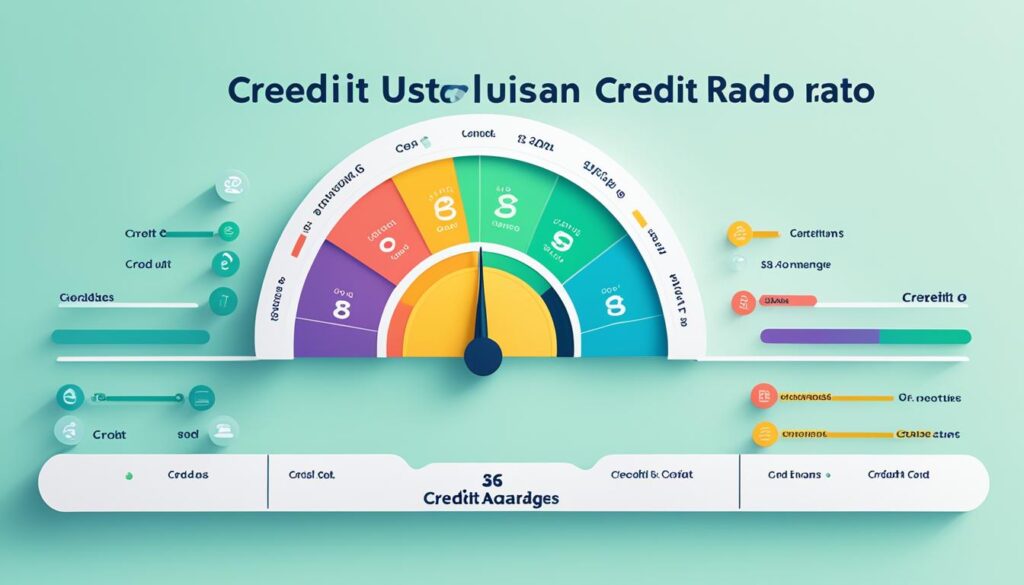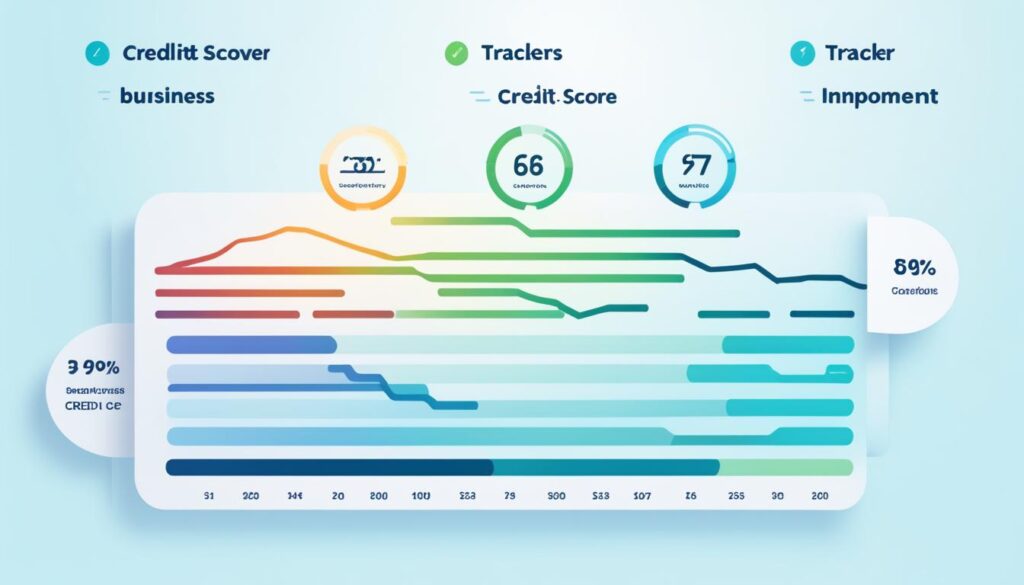Your business credit score is vital for doing well in business. It can either help you or hold you back from growth. To boost your score, start with the basics. This score shows how risky you are to lend money to. It looks at things like how much you owe, your payment record, credit use, and your business’s history. A high score means lenders see you as less risky. This can get you better deals on loans and business arrangements. Yet, a low score makes it tough to get good terms on loans or other deals.
Key Takeaways:
- Knowing what affects your business credit score is key to making it better.
- A better score raises your odds of getting loans with good terms.
- Paying bills on time, watching your credit use, and checking your score often are vital.
- Being steady and smart with credit helps keep and improve your score over time.
- Getting advice from pros can give your business credit score a boost. This could lead to financial success.
The Importance of Business Credit
Your business credit score greatly influences how lenders and others see your financial reliability. It shows your reputation and affects your credit and trade deals. A high score improves your loan chances on good terms. Yet, a low score might limit you to costlier loans.
A lender looks at your history of payments, what you owe, and how reliable you are. Making payments on time shows you are dependable. But, missing payments or owing too much can make them doubt your situation.
Trade partners also check your business credit. A strong score opens opportunities for better deals and payment options. However, a weak score could mean missed chances and tough payment terms.
Keeping a good credit score is vital for your business’s financial health. Paying bills on time and keeping balances under control is key. Doing so can boost your credit and status within the business world.
Your business credit is a powerful tool. A solid credit record helps you build strong relationships. This can lead to growth, better buying power, and improved cash flow.
It takes effort and a plan to keep a good business credit score. Check your credit regularly, pay your bills promptly, and use credit wisely. These steps can lead to a strong credit history and an edge in the market.
Key Benefits of a Good Business Credit Score:
- Access to favorable financing terms
- Opportunities for trade partnerships with suppliers
- Enhanced negotiation power for favorable payment terms
- Increased borrowing capacity
- Improved cash flow management
Improving your business credit can pave the way for lasting success and a secure financial future.
Steps to Improve Your Business Credit Score
Improving your business credit score can boost your business’s success. Follow the right steps to increase how dependable you look. This will help you win in future money matters.
1. Check Your Credit Files
First off, look through your credit files for mistakes. Any errors could pull your score down. If you see something wrong, let the credit bureaus know. This will make sure your true financial health is shown on your report.
2. Upload Financial Documents
Show your current financial status by uploading documents. It’s good to include your balance sheets and tax returns. This proves your business is stable and can raise your credit score.
3. Add Positive Trade References
Get good trade references onto your credit file. Ask your suppliers and others you do business with to report your on-time payments. This kind of history can really boost your credit score.
4. Streamline Your Payment Process
Make sure you’re paying your bills on time. Set up automatic payments or reminders. This helps you avoid fees for late payments. Also, fix any issues that could be slowing down your payment process.
5. Consider New Credit
Getting more credit can be smart. You could try for a new credit card or a line of credit. Just make sure to use it responsibly. Pay on time and keep your credit use low.
| Steps to Improve Your Business Credit Score: | Keywords |
|---|---|
| Check Your Credit Files | check, credit files, accuracy |
| Upload Financial Documents | upload, financial documents, current financial status |
| Add Positive Trade References | positive trade references, payment history |
| Streamline Your Payment Process | streamline, payment process, on time payments |
| Consider New Credit | new credit, responsible use, credit utilization ratio |
Following these steps will help lift your business credit score. Keep an eye on your credit regularly. Improving your score takes steady work. A better score means you can look forward to getting better finance deals. This can help your business grow and thrive.
Managing Credit Utilization Ratio
Your credit utilization ratio is crucial for a good credit score. It shows how much credit you use versus what’s available. Keeping this ratio low is key to boosting your credit score and financial well-being.
Experts suggest aiming for 30% or less. For example, with a $10,000 limit, try not to owe more than $3,000. This shows you handle money well to those who check your credit.
Here are some tips to control your credit utilization ratio:
1. Zero out your balance
Pay your credit card off completely each month to keep the ratio at 0%. This tells lenders you’re careful with money and not over-depending on credit. Paying wisely and budgeting ensures your ratio stays low.
2. Request a credit limit increase
Consider asking for more credit on your cards. Increasing your limit can cut your utilization rate. Just be sure not to max out your credit after getting more room.
3. Implement a payment strategy
Spread your payments out or pay more than once a month to lower what you owe. Regular, timely payments also help build a positive credit record. This record is vital for how trustworthy you seem to lenders.
By handling your credit utilization wisely, through smart spending and timely payments, you can upgrade your credit score. This helps you get better loan terms in the future.

| Credit Card | Credit Limit | Outstanding Balance | Credit Utilization Ratio |
|---|---|---|---|
| Card A | $5,000 | $1,500 | 30% |
| Card B | $10,000 | $2,500 | 25% |
| Card C | $2,000 | $500 | 25% |
| Total | $17,000 | $4,500 | 26% |
Debt Consolidation and Credit Score
One way to better your credit score is through debt consolidation. This means combining all your debts into one payment. Doing this can help you have a lower debt compared to your total credit and show you pay timely.
Before you jump into it, talking to an accountant is smart. They can look at your specific situation and see if consolidation fits your needs. They offer advice made just for you.
With debt consolidation, you might use less of your credit limit. This can positively affect your credit score. That’s because your credit use appears lower in the eyes of lenders.
Also, you get a chance to show you’re good at paying off debts. If you make payments on time, it’s seen as a responsible move. Lenders then see you as trustworthy.
To really improve your credit, you must work hard and be smart about money. While debt consolidation can help, it’s not everything. Always discuss your options with an expert.
The Benefits of Debt Consolidation:
- Lower credit utilization ratio
- Establish a positive payment history
- Streamline debts into one manageable payment
- Potential for lower interest rates
- Simplify debt management
Think about the good and bad of debt consolidation. And always get advice from the right people. This way, you can decide what’s best for your financial future.
Debt consolidation is a tool, but not the only one. It’s vital to be wise with money and credit for lasting financial health.
Factors Influencing Business Credit Rating
Many factors affect your business credit rating. Lenders and creditors look at these closely. They help them decide if you’re a good bet for credit.
Knowing these factors can help you steer your credit in a safe direction. Here are some important ones:
- Number of Trade Experiences: Each credit account and payment you make shapes your credit rating. More experiences show you’re reliable.
- Outstanding Balances: What you owe matters too. Keeping debts low and credit use balanced shows you’re responsible.
- Payment Habits: Paying on time is critical. It proves you’re dependable and helps your credit score.
- Credit Utilization: How much of your credit you use is important. Keeping it low is smart for your rating.
- Trends Over Time: Your credit history trends count also. Improving these can help your rating over time.
- Public Records: Bad items like bankruptcies influence your rating a lot. They’re not good for your score.
Keeping your credit rating healthy is essential. Check your report often for any mistakes. Also, ensure your vendors report your payments. This can boost your rating.
Example: Business Credit Rating Factors
| Factor | Description |
|---|---|
| Number of Trade Experiences | The total number of credit accounts and payment obligations in your credit history. |
| Outstanding Balances | The amount of money owed on your credit accounts. |
| Payment Habits | The timeliness and consistency of your payments to creditors. |
| Credit Utilization | The percentage of available credit that you have used. |
| Trends Over Time | The changes and patterns observed in your credit history over a period of time. |
| Public Records | Records of bankruptcies, judgments, or liens that can negatively impact your credit rating. |
Regularly analyzing these factors and improving your payments can lift your rating. By managing these wisely and keeping an eye on your credit, you set your business up for success.

Repairing and Setting Goals for Credit Improvement
Fixing your credit and aiming for better scores are vital for your business. By dealing with what you owe and managing your credit well, you can stand on better financial ground. This opens doors to new chances. Let’s go over how to repair and improve your credit by following key strategies:
1. Pay Off Debts
First, work on clearing your debts. This means paying down what you owe on business credit cards and loans. By reducing your debts, you lower your credit use ratio. This is big in scoring your credit. Try to pay off a lot to make yourself look more reliable.
2. Request a Credit Line Increase
Asking for more credit can also help. more credit available means you use a smaller percentage of what you have. This can boost your credit score. Talk to the folks who gave you the credit cards to see if you can get more. But, make sure you use the extra credit wisely and don’t rack up new debts.
3. Set Goals for Your Ideal Credit Score
Goals are great for keeping you on track with your credit. Figure out the credit score you want and break it down into smaller steps. If your score goal is 700 and you start at 600, try to boost it by 20 points monthly. Watching your score improve little by little helps you keep going strong.
4. Monitor Your Credit Reports
Keep an eye on your credit reports. This way you know what your credit status is at all times. Look for any mistakes that might drag your score down. If you find errors, tell the credit bureaus so they can fix them. Watching your reports helps you see how you’re getting better over time.
5. Make Payments on Time
Always paying on time is key to fixing and boosting your credit. Not paying on time hurts your credit a lot. Use alerts or auto-pay to make sure you’re never late. Paying on time shows you’re responsible and it boosts your credit standing.
| Benefits of Repairing and Setting Goals for Credit Improvement |
|---|
| Improved creditworthiness |
| Better access to financing and favorable terms |
| Lower interest rates |
| Increased leverage when negotiating with lenders |
Fixing your credit and aiming for better scores take time and effort. Pay off what you owe, try to get more credit, set clear goals, keep an eye on your credit reports, and always pay on time. These steps will help you rebuild your credit over time. Remember, it’s a journey. But the benefits of a better financial future are well worth it. Good luck!
Monitoring and Maintaining Business Credit Rating
Keeping track of and managing your business credit score is key. It’s vital for your business’s health and success. Make sure to check your credit history often and keep it updated. This way, your credit information stays accurate.
Here are some steps to watch your business credit score:
- Check your credit history often. Look for any mistakes, old information, or fraud.
- Get your credit reports from trusted sources. Check them for errors and report any you find.
- Verify that your payments are being reported correctly. Make sure positive payments are reflected in your credit file.
- Try not to apply for lots of new credit. Too many applications might hurt your score temporarily. Only get new credit when necessary.
To maintain a good credit rating, you also need to actively manage your finances. Here are a few things to do:
- Always pay on time. Late payments can damage your credit.
- Keep your credit balances low. Try not to use all of your available credit.
Watching and managing your business credit score can help your company. It leads to better financial options and a stronger position.

| Benefits of Monitoring and Maintaining Business Credit Rating |
|---|
| 1. Proactively identify and address any errors or inaccuracies in your credit file. |
| 2. Maintain a positive credit profile, demonstrating creditworthiness to lenders. |
| 3. Increase your chances of obtaining favorable financing terms and interest rates. |
| 4. Stay aware of any potential fraudulent activities or signs of identity theft. |
| 5. Build and strengthen your business’s financial reputation and credibility. |
Business Credit Score and Conventional Lenders
When you’re looking for credit, big lenders like commercial banks are key. They look closely at your business credit score. A high score is a must to get credit from them.
Your business credit score shows how good you are with money. It’s a main point for lenders when they decide to give you credit. It shows them you can handle debt well and are a safe pick.
Getting credit from these lenders is tough with a low score. They base loan offers and terms on credit scores. So, it’s key to keep your credit score high if you want their trust.
One way to boost your score is by using credit cards the right way. Paying on time and not using all your credit helps a lot. This shows lenders you’re good at handling credit.
The Importance of Credit History
Your credit score is based on your credit history, like how you’ve paid in the past. It shows if you’ve been good at managing debt. Having a good credit history is a green light for lenders.
To keep a good credit history, pay your bills on time and in full. Also, try not to use all your available credit. This makes you look reliable to lenders.
It’s also smart to stay on good terms with those you owe money to. Make sure they tell credit bureaus when you pay on time. Over time, these good reports can really help your score.
Comparing Credit Score Requirements of Conventional Lenders
| Lender | Minimum Credit Score Requirement |
|---|---|
| Commercial Bank A | 700 |
| Commercial Bank B | 680 |
| Commercial Bank C | 650 |
Different lenders need different credit scores. Look at what they ask for to find the best fit. This knowledge helps you aim at the right lenders for your business.
Working to improve your business credit score helps a lot. It makes it easier to get credit from big lenders. This is important for your business to grow and meet its goals.
The Long-Term Benefits of Improving Business Credit
Working on your business credit can really pay off. The better your business credit score, the more you get. This includes better financing and loan terms.
It opens doors to better loans and lines of credit fitting your business needs. You’ll get deals with low rates, longer payback times, and larger amounts of money. A strong score also means you can negotiate better insurance and lease deals.
Building up your credit leads to stability and growth. It helps not just now but in the future too. With a good rating, you stand out as a reliable partner to those who offer you credit.

The Power of Flexible Financing
Good credit changes the financing game for any business. It’s key for any kind of business need. You get to pick the best deals that match your plans and dreams.
Forget about getting stuck with bad loan choices. You can find financing that’s perfect for your specific projects. This freedom lets you invest in your growth wisely.
The Benefits of Favorable Terms
Better credit means getting better loan and supply terms. These deals come with lower rates, less fees, and nice payback plans. This can surely ease the burden and help you run your business better.
By enjoying better terms, you can manage your finances smarter. You can use the saved money to make your business stronger and more competitive.
The Competitive Edge
A strong credit score makes you stand out in the market. It tells everyone you’re stable and reliable. This can draw in more customers and improve your partnerships.
Plus, it helps when you need more credit later. You’re more likely to get it quickly and at a rate that helps, not hurts, your business.
| Benefits of Improving Business Credit |
|---|
| Flexible financing options tailored to your business needs |
| Lower interest rates and extended repayment periods |
| Larger loan amounts and bigger lines of credit |
| Increased negotiating power for insurance premiums and lease terms |
| Improved financial stability and growth |
| Enhanced credibility and trustworthiness with lenders and suppliers |
| Competitive advantage in the marketplace |
Start improving your credit today to reap these long-term rewards. By building a strong financial reputation and having access to the best financing, you pave the way for success and growth.
Expert Tips to Improve Business Credit Score
To boost your business credit score, you need patience and focus. Experts offer great advice to make your business more financially stable. Follow these tips for success.
1. Check Your Credit Files for Accuracy
First, check your business’s credit files. Make sure all info is correct. If you spot mistakes, fix them with the credit bureaus quickly.
2. Utilize Smart Spending and Payment Strategies
Think about what your business really needs before spending. Keep an eye on your spending to match your budget. Always pay your bills on time to build a good credit reputation.
3. Manage Your Credit Utilization Ratio
Try to keep your credit use low. You can do this by reducing how much you owe and increasing your credit limits. This shows you handle money wisely, boosting your credit score.
4. Consider Debt Consolidation, if Suitable
Debt consolidation may help if you owe money to many places. It means combining your debts into one with lower interest, making it easier to pay off. But, talk to a financial advisor first to see if it’s right for your business.
5. Foster Open Communication with Creditors
Talk to your creditors if you’re going to be late on a payment or are in financial trouble. Letting them know early can help you find new ways to manage your debt without hurting your credit score.
6. Ensure Positive Credit Experiences are Reported
Make sure your good payment history is getting reported to the credit bureaus by your vendors. This can increase your score and show lenders that your business is trustworthy. Ask your vendors to update your payment records regularly.
Stick to these expert tips to raise your business’s credit score. Being consistent and managing your money well are vital for your business’s financial health.
Comparison of Expert Tips
| Expert Tip | Key Benefit |
|---|---|
| Check Your Credit Files for Accuracy | Ensures that your credit information is correct and error-free |
| Utilize Smart Spending and Payment Strategies | Helps manage your financial resources effectively and establish a positive payment history |
| Manage Your Credit Utilization Ratio | Reduces your credit risk and demonstrates responsible credit management |
| Consider Debt Consolidation, if Suitable | Streamlines your debts and reduces interest payments |
| Foster Open Communication with Creditors | Allows for potential solutions and prevents negative credit reporting |
| Ensure Positive Credit Experiences are Reported | Improves credit score by showcasing positive payment history |
Adhering to these expert suggestions will significantly upgrade your business’s credit standing. Remember, enhancing your credit score is a journey that necessitates hard work and a steady approach. However, the benefits are considerable.
Conclusion
It’s important to make your business credit score better for success and trust. You can manage your credit well by applying the tips in this article. Staying on top of your credit, paying bills on time, and using credit wisely will help raise your score.
With effort and a steady approach, you can boost how others see your finances. This opens more chances for your business. A good credit score helps you get better loan deals, more types of loans, and stronger deals in business.
It takes time to lift your business credit score. Keep working on smart money practices and check your credit reports often. Following these tips will lead to a better credit score. This positions your business for lasting success in a tough market.
FAQ
How does my business credit score impact my business?
Your business credit score is vital. It affects whether opportunities are open to you. A good score makes it easier to get financing and better trade deals.
What factors are considered in calculating a business credit score?
To calculate your business credit score, they look at several things. This includes your outstanding balances, how timely you are with payments, and your credit use. They also check your trade history, how long you’ve been operating, and your business’s size.
How can I improve my business credit score?
Improving your business credit score starts with checking your credit reports for mistakes. Then, make sure to pay your bills on time. Adding good trade references also helps. Be smart with how you use credit and keep an eye on your credit reports.
Can debt consolidation improve my business credit score?
Debt consolidation might help. It can reduce your credit use and show a positive repayment record. But, always talk to your accountant first before you consolidate any debt.
What factors influence my business credit rating?
Many things affect your business credit. This includes your trade history, how much you owe, and your payment patterns. They also consider how you use your credit, any changes over time, and if there are any public records concerning your business.
How can I repair bad credit?
Fixing bad credit means paying off what you owe and lowering your credit card balances. Asking for a credit line boost can be a good step. Work towards a better credit score by making timely payments.
How can I monitor and maintain my business credit rating?
Keep an eye on your business credit rating to keep it good. Check your credit history and reports often. Make sure there are no mistakes and that your business partners report the right information about your business.
Why is my business credit score important when dealing with conventional lenders?
Conventional lenders look at your business credit score. A good score helps them trust your business more. This is key for getting loans and building a strong financial relationship with them.
What are the long-term benefits of improving my business credit?
Boosting your business credit pays off in many ways. You get better access to loans, nice loan terms, and lower insurance costs. It gives you more power when bargaining for leases too.
What are some expert tips to improve my business credit score?
Experts suggest checking your credit reports for errors. Being wise with how you spend and pay can make a big difference. Also, manage your credit use and consider debt consolidation if it makes sense. These steps can make your business more creditworthy, leading to financial growth.


















